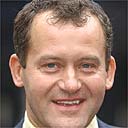The trial on theft charges of the former royal butler Paul Burrell collapsed today when it emerged he had told the Queen he was keeping some of Princess Diana's possessions.
Mr Burrell, 44, faced three charges of theft involving 310 items from the late princess's estate, and also from Prince Charles and Prince William.
Most of the items were discovered when police searched his home in Farndon, Cheshire, in January 2001.
The case against him had proceeded on the basis that he had not told anyone that he had kept items belonging to the princess.
The prosecution barrister, William Boyce QC, said today that it had emerged that Mr Burrell had told the Queen in a private conversation after Diana's death that he had kept some of her possessions for safe keeping.
The Queen had realised only after the case had started that her evidence might be relevant. She met the Duke of Edinburgh and the Prince of Wales last Friday and steps were then taken to bring the evidence to the attention of the police, Mr Boyce said.
"In all the circumstances, the prosecution has concluded that the current trial is no longer viable because it has proceeded on a false premise that Mr Burrell had never told anyone that he was holding anything for safekeeping.
"The prosecution consider that if the defence were to apply for the jury to be discharged, although it would be a matter for My Lady, the prosecution could not oppose that application," he told the Old Bailey.
Neither the police nor the prosecution had asked the Queen about the private meeting, which was mentioned in Mr Burrell's defence statement. The former butler did not disclose that he had told the Queen about his intention to keep some of Diana's possessions.
The Queen was not briefed on the way in which the case against Mr Burrell was being prepared, to avoid any suggestion that Buckingham Palace was trying to interfere with the investigation.
"Therefore Her Majesty had no means of knowing until after the trial had started of the relevance to the prosecution of the fact that Mr Burrell had mentioned to Her Majesty that he had taken items for safe keeping," Mr Boyce explained.
After hearing submissions from the prosecution and defence, the judge, Mrs Justice Rafferty, dismissed the jury and told Mr Burrell he was free to go.
Outside the court a delighted Mr Burrell said: "The Queen has come through for me. I'm thrilled, I'm so thrilled."
If the trial had continued Mr Burrell would have been called to give evidence, and may have faced questioning about his service in the Queen's employment as well as in Diana's.
Buckingham Palace denied that the case had been halted at the Queen's request. "There is no question of the Queen interfering in due legal process," a spokesman said.
The extraordinary twist began at 10.55am in Court No 1 when the judge said she had no ruling to make regarding a prosecution application for public interest immunity.
She told Lord Carlile QC, Mr Burrell's barrister: "I'm sure you and Mr Boyce will have words to exchange." A 10-minute adjournment followed.
Mr Burrell left the dock looking impassive but when he reached Lord Carlile his composure collapsed and he fell sobbing into the QC's arms.
Members of the press were asked to leave the courtroom and Mr Burrell immediately phoned his wife, Maria, on his mobile phone.
He left the courtroom surrounded by his lawyers and police.
